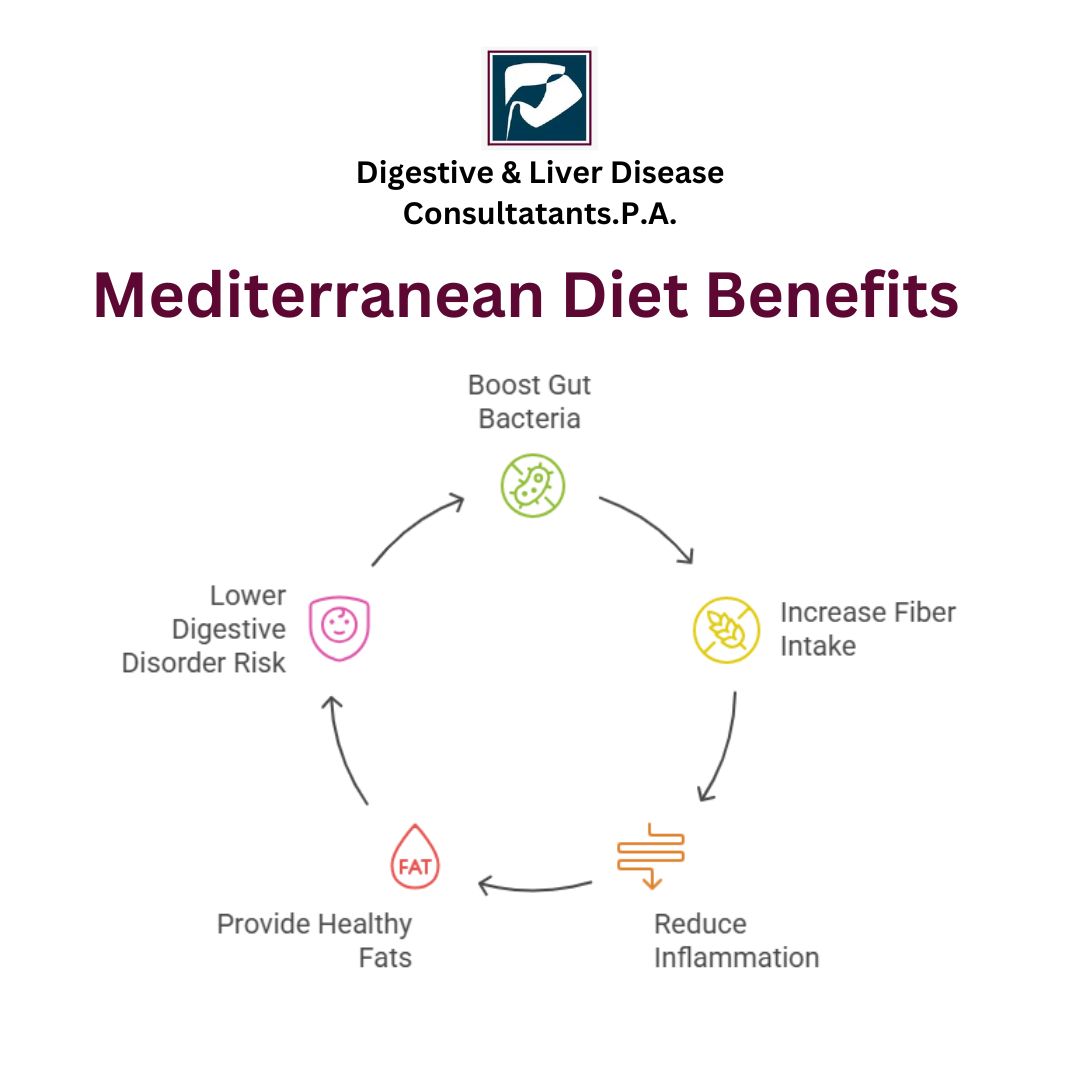When it comes to healthy eating plans, the Mediterranean diet is one of the most recommended by health experts around the world. Known for its fresh, wholesome ingredients and heart-friendly benefits, this diet is also a great choice for improving digestive health. At Digestive & Liver Disease Consultants, P.A., we understand how important your diet is in supporting your digestive system, and we often recommend dietary changes like the Mediterranean diet to patients with various digestive issues.
In this blog, let’s explore how the Mediterranean diet works, its key components, and how it can help keep your digestive system healthy and strong.
What Is the Mediterranean Diet?
The Mediterranean diet is based on the traditional eating patterns of countries bordering the Mediterranean Sea, including Greece, Italy, and Spain. It focuses on plant-based foods, healthy fats, lean proteins, and fresh produce, while limiting processed and sugary foods.
This diet isn’t just a temporary plan — it’s a sustainable lifestyle choice that promotes overall health, including digestive wellness.

Key Components of the Mediterranean Diet
The Mediterranean diet includes a wide variety of nutrient-rich, natural foods:
Fruits and Vegetables: A colorful variety of seasonal produce provides essential vitamins, minerals, fiber, and antioxidants.
Whole Grains: Foods like oats, brown rice, barley, and whole wheat bread help improve digestion and promote regular bowel movements.
Legumes: Beans, lentils, chickpeas, and peas are rich in plant-based protein and fiber.
Nuts and Seeds: Almonds, walnuts, chia seeds, and flaxseeds provide healthy fats and digestive-friendly fiber.
Healthy Fats: Olive oil is the main fat source, known for its anti-inflammatory benefits.
Lean Proteins: Fish and seafood, particularly fatty fish like salmon and sardines, are encouraged. Poultry and eggs are eaten in moderation.
Herbs and Spices: Natural flavor enhancers like garlic, basil, oregano, and rosemary reduce the need for excess salt.
Limited Red Meat and Sweets: Red meat is consumed occasionally, and sugary treats are rare.
How the Mediterranean Diet Supports Digestive Health
This diet’s benefits go beyond heart health and weight management. It offers several advantages for the digestive system:
1. Rich in Dietary Fiber
Fiber is essential for a healthy digestive system. It adds bulk to stool, supports regular bowel movements, and helps prevent constipation. The Mediterranean diet includes plenty of fiber-rich foods like fruits, vegetables, whole grains, legumes, and nuts, making it ideal for improving digestion.
2. Promotes Healthy Gut Bacteria
A balanced gut microbiome is key to good digestion. The Mediterranean diet’s variety of plant-based foods provides prebiotics — compounds that feed the beneficial bacteria in your gut. A healthy gut microbiome helps with nutrient absorption, reduces inflammation, and prevents digestive issues like bloating, gas, and irritable bowel syndrome (IBS).
3. Reduces Inflammation
Chronic inflammation can lead to various digestive problems, including gastritis, acid reflux, and inflammatory bowel disease (IBD). The Mediterranean diet is high in anti-inflammatory foods like olive oil, fatty fish, nuts, and leafy greens, which help calm inflammation and support a healthier digestive tract.
4. Supports Healthy Bowel Movements
Whole grains, legumes, fruits, and vegetables all promote healthy, regular bowel movements. These foods contain both soluble and insoluble fiber, which help regulate digestion and prevent constipation.
5. Eases Acid Reflux Symptoms
By limiting spicy, greasy, and processed foods, and focusing on light, plant-based meals with healthy fats, the Mediterranean diet can help reduce acid reflux symptoms and heartburn.
6. Reduces the Risk of Digestive Diseases
Studies show that people who follow a Mediterranean diet have a lower risk of developing certain digestive disorders, including colon cancer, fatty liver disease, and gallstones. This diet’s emphasis on plant-based, natural foods helps protect the digestive organs and improves long-term gut health.
Tips for Following the Mediterranean Diet
Adopting a Mediterranean-style eating plan is simple and flexible. Here are a few easy ways to get started:
- Add more fruits and vegetables to every meal. Aim for a variety of colors and types.
- Replace butter and margarine with olive oil when cooking or dressing salads.
- Choose whole grains like brown rice, oats, and quinoa over refined grains.
- Include fish at least twice a week, especially fatty fish like salmon and mackerel.
- Snack on nuts and seeds, but in moderation due to their high calorie content.
- Use herbs and spices to flavor your meals instead of salt.
- Limit processed and fast foods, as well as sugary drinks and desserts.
The Role of Digestive & Liver Disease Consultants, P.A.
At Digestive & Liver Disease Consultants, P.A., we are passionate about helping our patients improve their digestive health through personalized care, expert diagnosis, and effective treatment plans. Our experienced team of gastroenterologists and liver specialists work closely with each patient to develop a comprehensive approach to managing digestive issues — and dietary changes often play a big part in this.
Whether you’re dealing with bloating, acid reflux, IBS, or fatty liver disease, our specialists can help identify the root cause and recommend a tailored treatment plan that includes dietary guidance. We often advise our patients to adopt healthy, sustainable eating habits like the Mediterranean diet to support their digestive health and improve their quality of life.
Conclusion
The Mediterranean diet is much more than a trendy eating plan — it’s a proven, health-boosting lifestyle that can significantly improve digestive health. Its focus on fresh, fiber-rich, anti-inflammatory foods makes it ideal for preventing and managing various digestive problems, from constipation and acid reflux to more serious conditions like IBD and liver disease.
If you’re suffering from digestive discomfort or are concerned about your gut or liver health, don’t wait to seek help. Schedule an appointment with the specialists at Digestive & Liver Disease Consultants, P.A. today.






